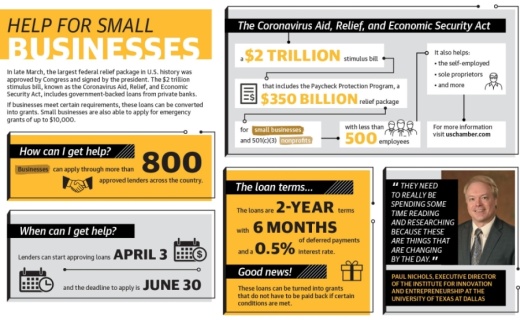“I know it takes a couple of months to get your business going anyway,” Forgette said. “But I’m a little worried. All my employees—I literally just hired them, and then, this happened.”
Like many restaurant owners, he was forced to close shop and switch to delivery and curbside services. Other businesses, such as bars, lounges, gyms and salons, have shuttered altogether.
Denton County’s stay-at-home order, which went into effect just before midnight March 25, essentially bans all public or private gatherings of any size occurring outside of one’s residence.
“As your county judge, I cannot stress enough the gravity of the situation we face in Denton County,” Denton County Judge Andy Eads said. “The situation we face will get worse before it gets better. How much worse depends solely on the actions we take going forward.”
The survival of small businesses is essential to the nation’s ability to regain footing once this crisis is over, said Paul Nichols, executive director of the Institute for Innovation and Entrepreneurship at The University of Texas at Dallas.
“They can throttle up a lot quicker,” he said. “The problem, though, is that they also don’t have the resources of a juggernaut, so they tend to throttle down a lot faster too.”
The public and private sectors have stepped in to soften the blow to the economy by providing monetary relief. With so much out there, it’s important that business owners focus on finding the relief that is right for them, Nichols said.
“They need to really be spending some time reading and researching because these are things that are changing by the day,” he said.
The strain on small businesses brought on by the coronavirus is threefold, said Marta Gomez Frey, director of the Collin Small Business Development Center.
Many establishments are not only struggling to get customers through the door but are also grappling with a skeletal workforce and inventory shortages, Frey said.
“The overall mood among business owners is sadness, desperation and frustration,” she said.
There are thousands of small businesses in Dallas-Fort Worth. In 2019, the U.S. Small Business Administration reported a collective 256,060 companies with 250 employees or less across Collin, Dallas, Tarrant and Denton counties. This represented a roughly 9% increase compared to the previous year.
VJ Jain is among those new business owners. He opened Delhi 6 Indian Kitchen & Bar on March 12 but soon had to shift to providing to-go and curbside pickup orders.
Despite the rough circumstances, he said his family is happy they chose to open in Highland Village.
“People have been so encouraging,” he said. “Customers have been saying, ‘Hang in there. We are with you. Don’t go anywhere.’”
Companies of all sizes have been forced to reinvent themselves in the wake of the crisis. Across DFW, businesses have pivoted to provide services.
“Good entrepreneurs are always able to take advantage of a shifting market or environment and make sure they stay just in front of customer needs,” Nichols said.
Mitch Lurie, for example, decided to use his custom furniture business to make 3,000 face masks to donate to the medical community.
“We’ve got sewing machines, and we’ve got professional seamstresses, so it was quite easy for us to transition,” said Lurie, owner of The Leather Sofa Co. “We just needed to find a pattern, fabric and elastic. Fortunately, a lot of the stuff that we use in making furniture, we were able to use and transition into making the masks.”
In all crises, there is also opportunity, Nichols said. While inconvenient, these adaptations may prove valuable down the line.
“For good or for bad, a lot of companies are going to be shaken up by this,” he said. “The decks are going to be shifted, so what can you do to take advantage of that changing situation?”
Jo Stokes was forced to temporarily close Urban Vybe of Flower Mound and Vybe 5 of Frisco over the shelter-in-place order. But she shifted her efforts online, creating a joint YouTube channel for her studios to stream daily workouts.
“This is just us trying to give back to the community and recognizing that there are a lot of people in need right now financially who still want to work out,” Stokes said. “What better way to make you feel better or hopeful than working out and feeling good in your body and knowing that you have a community of support?”
Even as bans on gatherings and limits on businesses are lifted, it’s going to take time for companies to make up for the loss in sales, to regain employees or to restock supplies, Frey said. For some it could take months or even years.
“It’s going to take a while for all those pieces to get back in order to be whole again,” she said.
Correction: This article has been corrected to list Marta Gomez Frey as the director of the Collin Small Business Development Center.




